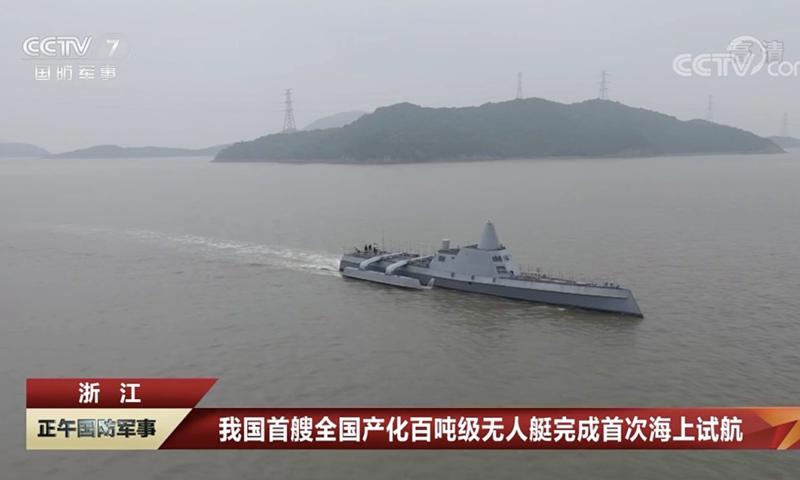
China's first 200 ton-class unmanned surface vessel carries out its first autonomous sea trial in Zhoushan, East China's Zhejiang Province on June 7, 2022. Photo: Screenshot from China Central Television
China's first domestically developed 200 ton-class unmanned surface vessel, characterized by its capabilities in stealth and far sea operation, has wrapped up its first autonomous sea trial, with analysts saying that drone ships like this can provide new tactics for naval warfare including distributed operations and swarm combat.
The sea trial took place in waters near Panzhi Island in Zhoushan, East China's Zhejiang Province on Tuesday and ended in success after three hours of data collection, China Central Television (CCTV) reported on Thursday.
The vessel has a displacement of about 200 tons, a length of more than 40 meters and a trimaran design. The unmanned surface vessel has a top speed of more than 20 knots, can carry out tasks under sea state 5, or rough waves, and can sail safely under sea state 6, or very rough waves, CCTV reported.
Some of the technical parameters of the vessel, including its detection range, stealth capability, integrated power system and comprehensive environmental awareness, are world-leading, media reports said.
"The voyage results are almost identical to what we expected. Next, we will conduct collision avoidance tests for the drone ship and further examine the vessel's performance," Zou Long, the on-site leader of the project, was quoted by chinanews.com as saying.
Zhejiang-based Beikun Intelligent Technology company started the project with research and development in late 2015, aiming to build a hundred ton-class, intelligent, autonomous and highly stealthy unmanned surface vessel with the ability to cruise in high sea conditions while making little noise.
The ship was launched on August 28, 2019 in Jiujiang, East China's Jiangxi Province, and sailed for 1,000 nautical miles in about 30 voyages in the Boyang Lake before arriving in Zhoushan in 2021, proving its initial navigational capability prior to the first sea trial, the report said.
With characteristics like outstanding stealth and high situational awareness, the drone ship could see military applications and provide many new tactics in naval warfare, a Beijing-based military expert who requested anonymity told the Global Times on Thursday.
There's no risk of casualties with unmanned equipment, so the drone ship can be sent into dangerous combat zones to carry out reconnaissance, anti-submarine, anti-aircraft or anti-ship missions with corresponding equipment, the expert said.
A group of drone ships can work as vanguards or scouts either for coastal defense or in a flotilla of larger warships with crews at far sea. They can be far away from each other and carry out distributed operations, meaning that enemies will have a hard time taking them out one by one, or they can form a swarm and overwhelm the enemies, the expert explained.
China is building an even more advanced, large drone ship. On May 31, the No.716 Research Institute of China State Shipbuilding Corp started construction of China's most advanced large unmanned ship, which is characterized by its high speed, long endurance and fully domestically developed propulsion system.




